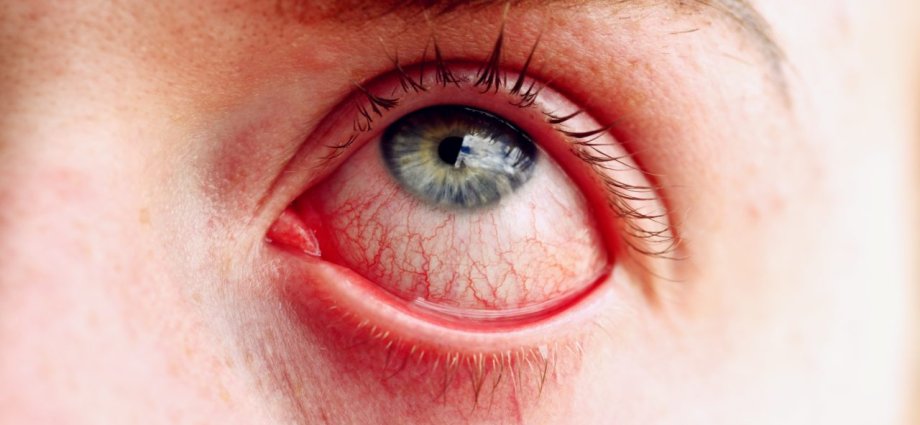COVID’S latest strain could be giving people pinkeye, making it even harder to tell apart from hay fever and other viruses.
The ‘Arcturus’ variant has spawned an increase in itchy eyes, especially in children, experts say.

The ‘Arcturus’ Covid variant could be giving people pinkeye, making it even harder to tell apart from hay fever and other viruses[/caption]
The strain — a subvariant of Omicron — has been spotted in 29 countries around the world, according to the World Health Organization, including the UK and US.
It is currently surging in India, where ministers have conducted drills to test hospitals’ preparedness for an influx of severe cases.
The WHO said the variant is “one to watch” because it appears to be more infectious, but insisted it does not seem to cause more serious illness.
Dr Maria Van Kerkhove, the WHO’s technical lead for Covid, said: “It’s been in circulation for a few months.
“We haven’t seen a change in severity in individuals or in populations, but that’s why we have these systems in place.
“We’re monitoring it because it has potential changes that we need to keep a good eye out on.”
With Covid testing no longer mandatory in the UK, many cases are likely to be missed or mistaken for other illnesses.
However, experts say itchy eyes could be an indication you have the virus.
Professor Paul Hunter, of the University of East Anglia, told The Sun: “That is apparently the case, though I have not seen any formal report.
“Having said that ‘pink eye’ or technically conjunctivitis is often seen with viral upper respiratory tract infections.
“It is more common with some viruses — adenoviruses in particular — than others. It is also more common in children.
“Conjunctivitis in a child was described as being associated with Covid back in April 2020. “
Professor Lawrence Young, of the University of Warwick, said: “Conjunctivitis — red, itchy and sticky eyes — appears to be a symptom of infection with the latest omicron subvariant, XBB.1.6, especially in babies and young children.
“It’s easily treated with eyedrops and resting the eyes, particularly from screen time.
“The trouble is that many of the relatively mild symptoms of infection with XBB.1.16 can be easily confused with other infections, allergies or hay fever.”
Hay fever symptoms can also start early in spring for many sufferers, while others don’t get sniffly until the summer, depending on the pollen type they are allergic to.
More than 20 per cent of the population are struck with hay fever each year.
The allergy can also cause itchy, red eyes, making it difficult to tell apart from the new Covid variant.
Professor Francois Balloux, of University College London, said: “Conjunctivitis, also called pinkeye, has been reported as a rare Covid symptom since 2020.
“It’s not obvious to me why the XBB.1.6.1 variant would cause it more frequently than the extremely closely related XBB.1.5 strain which is still dominant now.
“At this stage, I wouldn’t rule out that the increasing rate of pinkeye attributed to the latest Covid variant, is just due to spring hay fever, which tends to kick off at this time of year.”
How to tell if you have Covid, a cold, or hay fever
According to the NHS, the latest Covid symptoms can include:
- a high temperature or shivering (chills) – a high temperature means you feel hot to touch on your chest or back (you do not need to measure your temperature)
- a new, continuous cough – this means coughing a lot for more than an hour, or 3 or more coughing episodes in 24 hours
- a loss or change to your sense of smell or taste
- shortness of breath
- feeling tired or exhausted
- an aching body
- a headache
- a sore throat
- a blocked or runny nose
- loss of appetite
- diarrhoea
- feeling sick or being sick
The symptoms are very similar to symptoms of other illnesses, such as colds and flu.
Most people feel better within a few days or weeks of their first Covid symptoms and make a full recovery within 12 weeks.
For some people, it can be a more serious illness and their symptoms can last longer.
Cold symptoms come on gradually, according to the NHS, and can include:
- a blocked or runny nose
- a sore throat
- headaches
- muscle aches
- coughs
- sneezing
- a raised temperature
- pressure in your ears and face
- loss of taste and smell
The symptoms are the same in adults and children. Sometimes symptoms last longer in children.
The NHS lists hay fever symptoms as:
- sneezing and coughing
- a runny or blocked nose
- itchy, red or watery eyes
- itchy throat, mouth, nose and ears
- loss of smell
- pain around your temples and forehead
- headache
- earache
- feeling tired
If you have asthma, you might also:
- have a tight feeling in your chest
- be short of breath
- wheeze and cough
Hay fever will last for weeks or months, unlike a cold, which usually goes away after 1 to 2 weeks.











